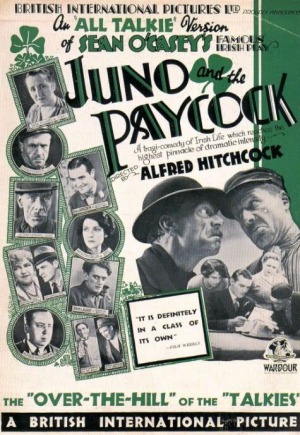 The Hitchcock Files is a continual feature at The Kuleshov Effect. In these posts, I take a detailed and chronological look at the filmography of Alfred Hitchcock. It should be noted that this series does not include his early silent films, though these are noteworthy in their own right.
The Hitchcock Files is a continual feature at The Kuleshov Effect. In these posts, I take a detailed and chronological look at the filmography of Alfred Hitchcock. It should be noted that this series does not include his early silent films, though these are noteworthy in their own right.
“All religions is passin' away. Take the real Dublin people, for instance. They know more about Charlie Chaplin and Tommy Mix than they do about S.S. Peter an' Paul.” –Juno and the Paycock
With the advent of sound and the unparalleled success of Blackmail, it’s no surprise that Hitchcock’s follow-up film was entirely a talkie. There would be no silent version. Sound was the biggest thing to hit cinema since the invention of the movie camera, and the studios were gung ho on using it as much as possible. Unfortunately, the technology at this point had still not been perfected, and the decision to use it in a film adaptation of the play Juno and the Paycock was probably not the best choice. The final product just goes to show that even with a master like Hitch at the helm, when the audio quality of dialogue is lacking (not to mention the heavy Irish accents), less is probably more.
Based on a play by Sean O’Casey, the film follows the Boyle family during Ireland’s civil war. The patriarch, Captain Boyle (Edward Chapman), is a lazy drunk who’d rather spend time squandering their meager finances in the pub with his friend Joxer than put in a hard day’s work. It’s up to his wife Juno (Sara Allgood) to make enough for them, their daughter Mary and their crippled son Johnny to survive. When Mary is courted by a wealthy benefactor who promises them a sizeable inheritance, the Captain quickly borrows money and spends it on extravagant living. Eventually it’s revealed that there will be no inheritance, Mary is pregnant out of wedlock, and Johnny has been killed by the IRA.
 There was a bit of an upset at the 2009 Academy Awards when it came to the Foreign Language Film category. Though most critics predicted that the Israeli film Waltz With Bashir or the French drama The Class would walk away with the top prize, the award instead went to a small Japanese film many people hadn’t seen. As I haven’t see either, I can’t say whether or not Departures indeed deserved to win. However, I can say that it’s a good film, despite a formulaic plot and a score that frequently distracts from the film rather than enhancing it.
There was a bit of an upset at the 2009 Academy Awards when it came to the Foreign Language Film category. Though most critics predicted that the Israeli film Waltz With Bashir or the French drama The Class would walk away with the top prize, the award instead went to a small Japanese film many people hadn’t seen. As I haven’t see either, I can’t say whether or not Departures indeed deserved to win. However, I can say that it’s a good film, despite a formulaic plot and a score that frequently distracts from the film rather than enhancing it.
Departures follows Daigo (Masahiro Motoki), a cellist who moves back to his old hometown after his orchestra is dissolved. Desperate for a job, he spies a classified ad for “assisting departures” and decides to apply, thinking it’s most likely for some sort of travel agency. It’s actually a listing for a funeral home and involves the ceremonial cleaning and preparation of bodies in front of mourners before they can be placed in a coffin. Given the taboo nature of death in Japanese society, it isn’t exactly a dream job, but he decides to give it a try at the behest of the director, Mr. Sasaki (played to perfection by Tsutomu Yamazaki).
 Are you:
Are you:
a) a fan of good music,
b) someone who doesn’t automatically dismiss any film described as “artsy,”
c) a consumer of hallucinogenic and psychedelic substances, or
d) a tortured soul consumed by angst and searching for your place in the universe?
If you answered “yes” to any of those, you’ll probably like The Wall, the 1982 musical film based around the Pink Floyd album of the same name. And if you answered “yes” to all four, it could potentially become one of your all-time favorite films - the cinematic equivalent of manna from heaven.